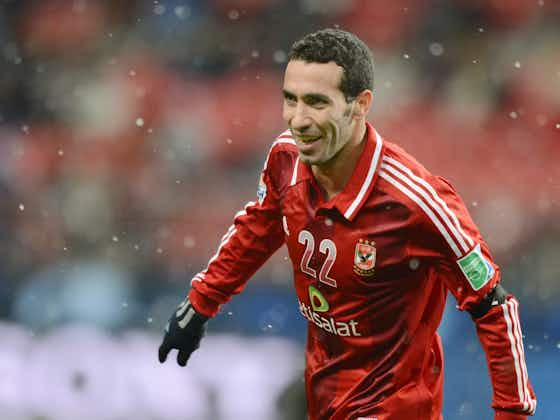Attacking Football
·21 February 2024
Mohamed Aboutrika from Egyptian Icon to Egyptian ‘Terror List’

In partnership with
Yahoo sportsAttacking Football
·21 February 2024

Aboutrika’s name frequently stands out as the most obvious figure when talking about Egyptian football legends. Mohamed Aboutrika was more than just a football player; he was considered a hero in Egypt, admired for his skill on the pitch and his meaningful actions outside of it.
His path took an unexpected turn when he became embroiled in a scandal that led to his name being added to Egypt’s terror list. This story looks into the fascinating and turbulent journey of Mohamed Aboutrika, from being regarded as a national hero to facing allegations and political controversies.
Mohamed Aboutrika’s career took off when he signed with Al Ahly in the early 2000s. Before that, he had played for his hometown team, Tersana, for seven years, during which time he had shown signs of promise and been instrumental in helping the team advance and establish itself in the Egyptian Premier League. Aboutrika signed with Al Ahly after a slump in which the Red Devils failed to win the league championship for four years. He arrived in the middle of the 2003–04 season, and although he scored 11 goals in 13 games to start his Al Ahly career, it was insufficient to send the team to the top of the standings.
The following season, Al Ahly ended their league success drought as they lifted the crown, with Aboutrika providing 17 goal contributions. Al Ahly also lifted the CAF Champions League, with Aboutrika scoring the opening goal in the 3-0 second-leg win. This marked the beginning of Aboutrika’s and Al Ahly’s era of dominance.
Three years after his first appearance for the national team in 2001, The Magician made a comeback to the squad due to his impressive performances for his club. As he was rejoining the group, Egypt was preparing to host the 2006 African Cup of Nations. Aboutrika had an impressive AFCON debut, scoring two goals in the group stage and securing the game-winning penalty to lead Egypt to their fifth championship victory over Ivory Coast in the final. Aboutrika had a successful 2006, winning the Egyptian domestic league trophy along with medals from the CAF Champions League and the AFCON.
Due to injuries in 2007, he was only able to play 15 times as Al Ahly retained their domestic and continental titles. However, with the 2008 AFCON rapidly approaching, pressure mounted on Egypt and Aboutrika to win back-to-back titles as African champions for the first time in their history. Aboutrika doubled his total from the previous tournament with four goals, including the winning goal against Cameroon in the final.
During the period from 2004–05 to 2010–11, Al Ahly and Aboutrika clinched seven consecutive league titles, marking their era of dominance that lasted until his retirement in 2013. Aside from their success in the local league, Al Ahly also clinched several CAF Champions League trophies in 2008, 2012, and 2013.
Following the overthrow of then-President Hosni Mubarak during the Arab Spring, Egypt experienced a period of political turmoil characterised by popular unrest and a complex political environment. This environment led to the rise of the Muslim Brotherhood, which briefly took over the government. Aboutrika declared at this time of instability in the community that he would not play in the Egypt Super Cup Final versus ENIPPI, which was supposed to be the first domestic game in Egypt following the seven-month suspension of professional football.
In doing so, Aboutrika sided with Ultras Ahlawy, an ultra-group for Al Ahly, who was the club’s highly politicised support group. Ultras Ahlawy opposed the resumption of football as they sought justice for the 74 Al Ahly supporters who were killed in Egypt’s worst sporting incident in a politically loaded brawl in the Suez Canal City of Port Said as fans were permitted to attend football matches.
Some believed that, in siding with Ultra Ahlawy, Aboutrika had links with those within the Muslim Brotherhood. The evidence they used is that during his goal celebration, Aboutrika would celebrate by displaying the ‘Rabaa sign’, which is a hand gesture associated with the Muslim Brotherhood, and it’s used to commemorate the victims of the Rabaa massacre in 2013.
His ownership of shares in the Asshab Tours Company, allegedly run by a Muslim Brotherhood member, is another piece of evidence connecting Aboutrika to the organisation. The football player vehemently denies having any affiliation with the Brotherhood and maintains that he is politically neutral and only wants what is best for his country.
Aboutrika was placed on Egypt’s terror list in 2017 despite his denials, and as a result, his assets were frozen, and he was subject to travel restrictions. The desire to punish anyone who has ties to the Muslim Brotherhood served as justification for the inclusion. Many came out in favour of Aboutrika, saying that his charitable work and devotion to football transcend any political connections. On the other hand, proponents of the Egyptian government argue that everyone must obey the law and that adding Aboutrika to the terror list is an essential measure to safeguard national security. As of writing, Aboutrika remains on the terror list.
Mohamed Aboutrika’s athletic prowess and Egypt’s political environment have shaped the complex story of his transition from Egyptian icon to terror list member. His fall from grace has affected the country, highlighting how closely politics, athletics, and public opinion are intertwined.






























































